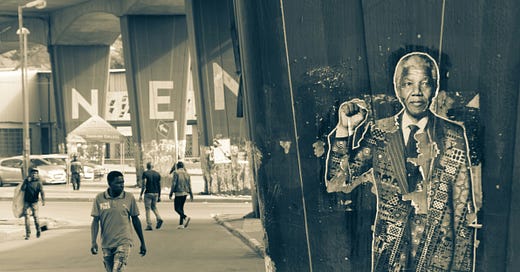Some of the desires that motivate the common life of humans are so fierce they might be gods. The ferocity with which such wild wants are pursued can make this earth a hell. Throughout human history few idols drew forth as great a degree of fanaticism as have kinship (real or imagined). I saw the murderous effects of the idolatries of race and ethnicity up close as a teenager active in the struggle against apartheid in 1980s South Africa and again as an interpreter for the South African Truth and Reconciliation Commission in the 1990s. This series draws out the similarities I notice between the Christian nationalism into which I was born and from which I converted and the Christian nationalism now rampant in North America.
I had imagined that the struggle against Christian nationalism—including my own struggle—ended in victory on June 24, 1995. Now, thirty years later, the Trump administration's new agenda, itself animated by the same nationalistic heresy that once coursed through South African apartheid, has laid my naivety bare.
Why June 24, 1995? On that glorious day, I enjoyed a barbecue (or as we say in Afrikaans, a braai) with friends and by television watched the South African national team, the Springboks, decisively defeat the New Zealand All Blacks to win the Rugby World Cup. It was not the World Cup itself that was glorious: it was how all South Africans, people of every race and ethnicity, came together to support and celebrate the Springboks. Such expression of common humanity and patriotism was unprecedented in the South African context, deeply riven by racial and ethnic enmity during the preceding 47 years of apartheid.
Contrary to what I believed for the past three decades, the heart of Christian nationalism still beats in 2025. And the powers it animates today are far greater than the powers it animated in 1995.
To see Nelson Mandela, the first truly democratically elected—and the first Black—president of South Africa, wear the green and gold rugby jersey of the Springboks at that game was to revel in the glorious possibility of a future of peace overcoming ethnic enmity, of races reconciling, and of prosperity becoming available to all South Africans.
Why was Nelson Mandela in the Springbok jersey a sign, in particular, of victory over Christian nationalism? Because it exposed the heresy of Christian nationalism, which provided the motivating heartbeat beneath the policies and practices of the apartheid regime in South Africa. This heresy holds that, in the age after the Easter resurrection of Christ, God blesses chosen nations with covenants and bestows privileges upon certain persons on the bases of ethnicity and race. In response to this heresy, Father Trevor Huddleston CR, in his prophetic Naught for your Comfort (1956), described Christian nationalism as an inherent blasphemy against the nature of God, who created humanity in God’s own image. The election of Mandela as president of South Africa, I then believed, represented the flatlining of Christian nationalism.
Why, now, do I consider that 1995 belief of mine to have been naive? Because, on May 21, 2025, Donald Trump confronted the now-president of South Africa, Cyril Ramaphosa, with false claims of genocide against white South Africans. Such claims were derived from propaganda engineered by Afrikaner organizations motivated by the very same Christian nationalism that animated the apartheid regime. Contrary to what I believed for the past three decades, the heart of Christian nationalism still beats in 2025. And the powers it animates today are far greater than the powers it animated in 1995.
How might I account for my naivety? Perhaps my naivety resulted from confusing two stories, one represented by Nelson Mandela and the other by Archbishop Desmond Tutu.
I will write more about my confusion between these two stories in my next contribution to Idols of our Fatherlands.
If you would like to learn and discuss Christian nationalism and authoritarianism in more depth, we invite you to join ICS’s Summer Read with Kristin Kobes Du Mez and Bruce Berglund: https://f2bf.icscanada.edu/#summer-read.







Thank you for this, Gideon. I really appreciate you sharing your expertise and wisdom in this moment. Looking forward to the next posts...
This hit like prophecy from someone who’s already been to the mountain—and knows how easy it is to fall back down.
Gideon, your voice cuts through the fog with the authority of someone who’s seen what Christian nationalism becomes when it matures unchecked: not just a bad theology, but a weaponized myth, baptized in blood and wrapped in flag.
The Mandela moment was beautiful precisely because it felt like exorcism. But the demon wasn’t slain—just dormant, waiting for another altar. And now in 2025, it’s trading Springbok jerseys for MAGA hats and resurrecting the same heresy: that God plays favorites, and His favorites just happen to look like the people in power.
Looking forward to the next installment. The church needs this reckoning—or it will become, once again, the chaplain of empire.
—Virgin Monk Boy